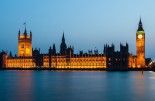Han Dieperink: The ideal size of the government
Han Dieperink: The ideal size of the government

This column was originally written in Dutch. This is an English translation.
By Han Dieperink, written in a personal capacity
The optimal size of government is an issue that has attracted the attention of researchers for decades. American economist Arthur Laffer illustrated in the early 1980s that there is an optimal tax rate that maximizes tax revenue, but that the government must be much smaller to maximize growth potential.
Since then, many publications have been published that attempt to determine the optimal government share of GDP that will maximize GDP growth. Meanwhile, total government expenditure as a share of GDP has risen continuously throughout the 20th century, peaking at 41% for OECD countries just before the coronavirus pandemic. It is now clear that economic growth has suffered from the increase in taxes and government expenditure, which were above optimal levels in most countries.
The government is often seen as a corrective to the shortcomings and excesses of the market. The government provides the public goods that the market cannot provide and removes the distortions in resource allocation caused by externalities.
But government power is also used or abused for (political) purposes. It does not matter much whether it is a democracy with new promises to the voters every four years or a dictatorship that tries to keep the population satisfied with low energy and food prices. New promises are being made again and again to larger and larger groups in society.
According to the medieval Arab philosopher of history Ibn Khaldoun, this is the way in which every society ultimately falls apart. When an increasingly smaller group has to bear the burden for an increasingly larger group, a large government is no longer a solution, but a problem.
Empirical evidence shows that for most countries, small government and low government spending works best. There are economists who argue that big government will accelerate economic growth by providing public goods and correcting market failures. According to this school, government consumption will also increase investment and employment through multiplier effects on aggregate demand.
However, Wagner's Law, which states that an increasingly complex society requires more regulation and infrastructure, also implies that government spending will increase more than proportionally when economic growth accelerates. After all, there will be a need for more administrative and protective functions from the state, more social and cultural goods and services, and good administrative and bureaucratic controls to guarantee the proper functioning of market forces. That is exactly where things went wrong under communism.
All this complexity and regulatory burden forces large governments to levy higher taxes, discouraging private investment. These private investments are also being displaced by government investments. The return on this decreases as governments undertake activities for which they are not suitable. And there are many. Finally, a larger government results in less wealth creation, because governments are simply not that good at adapting to changing circumstances (advancing insight) and are much less innovative in increasing value.
Since the pandemic, the government has grown significantly. On the one hand, money had to be released to support the economy. On the other hand, the rapid growth of debt in combination with rising interest rates means that an increasing part of the growth is being consumed by interest costs. In addition, there are increasing government programs to compensate for the pandemic, for the energy transition, for infrastructure, for deglobalization (semiconductors), etc. These investments threaten to crowd out private investments.
Due to the increasing budget deficit, the government is also increasing its share of the capital markets. The role of the government is also growing in the labor market. We can even speak of the government as a real job machine. Unfortunately, all these new government jobs have not been created in education or healthcare, but are mainly consultants who have to supervise the various investment programs. While there is a major shortage in the private labor market. The government is getting bigger, at the expense of the private sector.
The government must intervene where the market fails, especially if this ensures optimization of economic growth potential. Good healthcare and good education for everyone are part of this, but then government expenditure - in addition to all other tasks - quickly approaches 45%. That's pretty much the ceiling.
Historically, a government size of approximately 25% is often seen as ideal, but this is mainly about the short-term growth potential. The focus should be on long-term growth potential. Good education and good health care contribute to this. This greater role for the government also provides more stability, but it does put pressure on labor productivity.
This depressing effect on labor productivity can now be offset by the positive effects of artificial intelligence, in theory a technology that is ideal for managing all that regulatory burden. Artificial intelligence is ideal for automating boring and mind-numbing work. This will also happen in the government.










